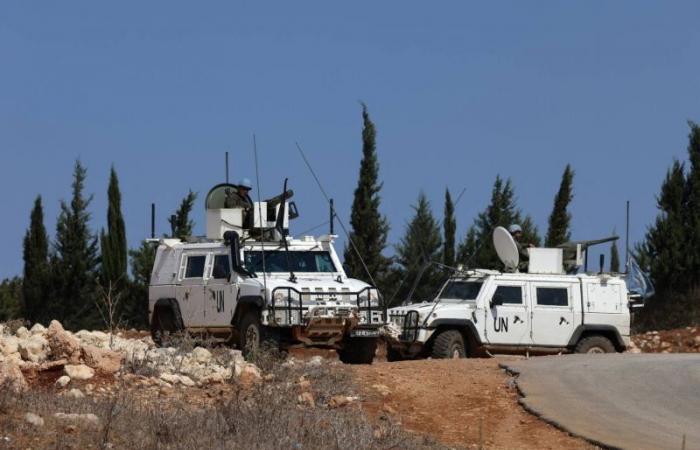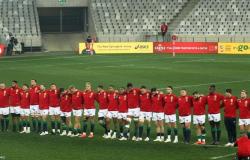The G7 defense ministers and the head of European diplomacy demanded on Saturday in Naples respect for the UN peacekeeping mission in Lebanon (UNIFIL), which accuses Israel of deliberately targeting its positions from escalation of violence with Hezbollah last month.
Italy, which holds the rotating presidency of the group of seven most developed democratic countries, had included on the agenda of this one-day meeting the crisis in the Middle East, the war in Ukraine and the security situation in the Asia-Pacific region.
Defense ministers from the United States, France, Germany, Japan, the United Kingdom, Canada and Italy discussed the escalation in the Middle East on Saturday morning, where the military Israeli continues its operations against Hezbollah but also its strikes in Gaza despite the death of Hamas leader Yahya Sinouar. Also present in Naples were the Secretary General of NATO, Mark Rutte, and the head of European diplomacy, Josep Borrell. The latter estimated during a press briefing that the death of Hamas leader in Gaza, Yahya Sinouar, mastermind of the unprecedented attack launched on October 7, 2023 in Israel by Hamas, opened “a new perspective” in sight. of a ceasefire. “This should be an opportunity under which an agreement on a ceasefire and the release of the hostages could be reached. And that would open the door to more humanitarian aid,” he said.
Read also
War in Lebanon: has resolution 1701 become obsolete?
Several world leaders have expressed hope that the death of Yahya Sinouar opens the way to a ceasefire and the release of the hostages. American President Joe Biden saw this as an opportunity for “a path to peace” in the Middle East.
Israeli Prime Minister Netanyahu, for his part, warned that the death of the Hamas leader, one of the objectives of the Israeli government since October 7, “does not mean the end of the war in Gaza, but the beginning of the end”.
Israeli strikes on Gaza continue, as do military operations in Lebanon against Hezbollah, which opened a front against Israel on October 8, 2023. After nearly a year of border fire exchanges with Hezbollah and after weakened Hamas in the Gaza Strip, the Israeli army moved the front of the war to Lebanon in mid-September.
Finul under fire
On this point, the G7 ministers expressed their “concern about all threats against the security of UNIFIL”, the UN peacekeeping mission in Lebanon, without however mentioning Israel. “The protection of peacekeepers is the responsibility of all parties in a conflict,” they insisted in a joint statement issued at the end of the summit. UNIFIL, made up of around 9,500 soldiers from more than 50 countries, accused the Israeli army of “deliberately” firing on its positions, injuring several people.
The Israeli military says it was not targeting the peacekeepers, but the incidents sparked a wave of international criticism. With a thousand soldiers, Italy is the second contributing country to UNIFIL.
Josep Borrell suggested strengthening the mandate of UNIFIL, without specifying the contours of such a reform which requires, he recalled, “a decision by the United Nations Security Council”. “They cannot act autonomously, it is obviously a limited role,” he noted.
The G7 defense ministers also looked at Ukraine, at a time when kyiv, soon facing its third winter of war, is struggling in the face of the Russian invasion. They reaffirmed their “unwavering support for the freedom, sovereignty, independence and territorial integrity of Ukraine, for as long as necessary”, emphasizing their “intent to continue providing assistance to the Ukraine, including military, in the short and long term.” The G7 approved a $50 billion loan program to kyiv in June, drawing on profits from interest on frozen Russian assets. But Western aid is showing signs of weakness almost everywhere and the United States, in the event of Donald Trump’s victory in the presidential election in November, could radically review its policy.
The G7, the ministers further indicated, “supports Ukraine on the irreversible path of its Euro-Atlantic integration, including its entry into NATO”. Presenting his “victory plan” this week, Ukrainian President Volodymyr Zelensky urged the Atlantic Alliance to invite kyiv.
The G7 defense ministers and the head of European diplomacy demanded on Saturday in Naples respect for the UN peacekeeping mission in Lebanon (UNIFIL), which accuses Israel of deliberately targeting its positions from escalation of violence with Hezbollah last month. Italy, which holds the rotating presidency of the group of seven countries…
- -





